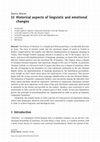Papers by Şeyma Afacan

Journal of Islamic Studies , 2021
The phenomenon of ‘materialism’ in the late Ottoman Empire has long been explained as the vehicle... more The phenomenon of ‘materialism’ in the late Ottoman Empire has long been explained as the vehicle of fully-fledged modernization (i.e., Westernization and secularization) in allegedly essential opposition to tradition and religion. Amid growing intellectual interest in aspects of the individual such as mind, soul, brain, and emotions in the late Ottoman period, this paper shifts the explanatory focus from religious vs. nationalist ideologies to the discourse of ‘productivity’. It argues that before the discourse of national homogenization came to dominate intellectual writings in the late Ottoman Empire, a new language about the regulation of body and emotion was formulated with the aim of increasing labour productivity and rational conduct. The debate between materialism and spiritualism was embedded in this new language. The first section of the paper reviews relevant secondary literature to question what we know about the phenomenon of Ottoman materialism. The second moves on to the over-abundance of machine metaphors in materialist writings with particular focus on Abdullah Cevdet’s books on brain physiology, and in light of the spread of mechanistic views of human nature in the late nineteenth century. The final section presents Baha Tevfik’s problematization of sensibility (hassasiyet) as an obstacle to greater social harmony based on rational conduct as a case study of the regulation of emotion in the early 1910s, when interest in scientific and philosophical literature on human nature and the soul reached its zenith. This paper shows the ways in which Ottoman materialism became an important tool to imagine the individual as a unit of production, whose soul was rendered idle and whose emotions were subjected to regulation.

Contemporanea, 2023
Ottoman studies is a vibrant and ever-evolving field, where our understanding of the Empire is co... more Ottoman studies is a vibrant and ever-evolving field, where our understanding of the Empire is continuously reassessed in different intellectual and political contexts and enriched by a diverse range of sources. The context of the centenary provides us with an auspicious occasion to discuss the Empire’s political demise and to reflect on the state of our field. Taking advantage of this momentous milestone, I extended an invitation to some of my colleagues who have adopted innovative approaches, made use of diverse sources, and employed new methodologies in their latest studies. They kindly responded to my call, and submitted their papers.
In this roundtable, Afacan introduces the history of emotions as a new field and discusses its potential as an «analytical tool» for studying different periods of Ottoman history. In doing so, she reflects on the possible risks of walking on the «slippery ground» of emotions, such as over-generalizations or confusing social norms with emotions. In the second contribution, Akpınar contextualizes the importance of environmental history in Ottoman studies and emphasizes the value of an «interconnected» conceptualization between state, society, and environmental factors in the study of Ottoman and Turkish modernization. Mazzucotelli then addresses the changes in the historiography of Ottoman rule in the Levant, showing how an interplay of Orientalism, Eurocentrism, nationalism, and views of Ottoman decline played a role in the region’s troubled political and social context. Next, Ozavcı clari- fies how to update our knowledge of one of the most important diplomatic issues of the nineteenth century, the Eastern Question. Topal, on the other hand, focuses on conceptual history as a method for approaching the Ottoman Tanzimat and modernization. Finally, Yenen’s paper zooms in on the historiography of the dissolution of the empire and discusses the challenge of methodological nationalism and the limitations of imperial vs. national policy conceptualizations.

Seyma Afacan, « Searching for the Soul in Shades of Grey », European Journal of Turkish Studies [Online], 32 | 2022, Online since 30 April 2022, connection on 06 July 2022. URL : http://journals.openedition.org/ejts/7248, 2022
The years between the 1870s and 1920s have been considered a transformative period for psychology... more The years between the 1870s and 1920s have been considered a transformative period for psychology, during which it prepared to leave the house of metaphysics, religious thought, and the moral sciences to join the team of the sciences. In depicting the transition from the "science of the mind" to modern psychology, the mainstream historiography has produced a narrative of linear and overnight transition from a whole body of philosophical and theological knowledge built around the concept of the soul, beginning with the foundation of modern academic institutions. In the late Ottoman Empire, however, the soul continued to attract Ottoman academics and intellectuals under

Language and Emotion: An International Handbook (Volume 1 edited by: Gesine Lenore Schiewer, Jeanette Altarriba and Bee Chin Ng) De Gruyter Mouton 2022 , 2022
The history of emotions is a complicated field presenting a considerable diversity of views. The ... more The history of emotions is a complicated field presenting a considerable diversity of views. The story of emotive words and the emotional impact of words in Turkish is further complicated by the lengthy and effective implementation of language planning in Turkey. Even though Turkish language reform is accepted as one of the longest, most famous, and successful implementations of language planning, we know little about how it affected cultural patterns and the emotional life of speakers. This chapter shows a degree of interplay between linguistic and emotional change in the case of Turkish, in particular Ottoman Turkish, at a discursive level. It argues that there was a degree of awareness about the role of language in the formation of a new emotional community in the late Ottoman Empire before the implementation of language planning by the Republican government, even though we don’t know much about the implications of this awareness. This process began with the rising concerns about language simplification in the late Ottoman Empire. The formation of linguistic community fuelled a new discussion among the educated class about which emotions should be expressed, cultivated or suppressed. Emotional restraint surfaced as the most important social value of the new emotional community, participated in primarily by the literati and possibly by the readers. Speakers were motivated to unite emotionally in their concern for the common good of their society. In the early Republican period, the principle of monolingualism was implemented in order to speed up linguistic community formation.
Ultimately, the chapter leaves us with a picture of a long process of negotiation during which some languages, emotions and words were contested in a largely unsystematic way in order to achieve linguistic and ideological unity.
Toplumsal Tarih, Mart , 2022
Edebiyatın Duygu Haritası, ed. Esra Dicle, Dergah Yayınları , 2022
Atelye: Edebiyat ve Duygular, ed. Hazal Bozyer, Vakıf Bank Kültür Yayınları , 2023
Book Reviews by Şeyma Afacan
EURASIAN STUDIES 20 (2023) 229-258, 2023
Conference Organisations by Şeyma Afacan
The History Foundation and IFEA joined forces to organize a two-day conference to celebrate the C... more The History Foundation and IFEA joined forces to organize a two-day conference to celebrate the Centenary of the Republic of Turkey. It is an honor and privilege to be a part of the organization team and to present a paper with such prolific historians. All are welcome! The seats are extremely limited, though. For registration please contact us at revolutionsbeyondthewest@gmail.com as soon as possible. And for broadcasting possibilities, stay tuned.
Şeyma Afacan ile beraber Tarih Vakfı desteğiyle düzenlediğimiz sempozyumun programı ve özetleri.
Talks by Şeyma Afacan
Thesis Chapters by Şeyma Afacan
Bu tez Osmanlı Đmparatorluğu'nun modernleşmesi bağlamında ruh sağlığı tarihi alanında bir perspek... more Bu tez Osmanlı Đmparatorluğu'nun modernleşmesi bağlamında ruh sağlığı tarihi alanında bir perspektif sunmaya çalışmaktadır. Araştırmanın amacı Foucault'cu teorik bir çerçevede sosyal tıp tarihine mütevazi bir katkı sağlamaktır.











Uploads
Papers by Şeyma Afacan
In this roundtable, Afacan introduces the history of emotions as a new field and discusses its potential as an «analytical tool» for studying different periods of Ottoman history. In doing so, she reflects on the possible risks of walking on the «slippery ground» of emotions, such as over-generalizations or confusing social norms with emotions. In the second contribution, Akpınar contextualizes the importance of environmental history in Ottoman studies and emphasizes the value of an «interconnected» conceptualization between state, society, and environmental factors in the study of Ottoman and Turkish modernization. Mazzucotelli then addresses the changes in the historiography of Ottoman rule in the Levant, showing how an interplay of Orientalism, Eurocentrism, nationalism, and views of Ottoman decline played a role in the region’s troubled political and social context. Next, Ozavcı clari- fies how to update our knowledge of one of the most important diplomatic issues of the nineteenth century, the Eastern Question. Topal, on the other hand, focuses on conceptual history as a method for approaching the Ottoman Tanzimat and modernization. Finally, Yenen’s paper zooms in on the historiography of the dissolution of the empire and discusses the challenge of methodological nationalism and the limitations of imperial vs. national policy conceptualizations.
Ultimately, the chapter leaves us with a picture of a long process of negotiation during which some languages, emotions and words were contested in a largely unsystematic way in order to achieve linguistic and ideological unity.
Book Reviews by Şeyma Afacan
Conference Organisations by Şeyma Afacan
Talks by Şeyma Afacan
Thesis Chapters by Şeyma Afacan
In this roundtable, Afacan introduces the history of emotions as a new field and discusses its potential as an «analytical tool» for studying different periods of Ottoman history. In doing so, she reflects on the possible risks of walking on the «slippery ground» of emotions, such as over-generalizations or confusing social norms with emotions. In the second contribution, Akpınar contextualizes the importance of environmental history in Ottoman studies and emphasizes the value of an «interconnected» conceptualization between state, society, and environmental factors in the study of Ottoman and Turkish modernization. Mazzucotelli then addresses the changes in the historiography of Ottoman rule in the Levant, showing how an interplay of Orientalism, Eurocentrism, nationalism, and views of Ottoman decline played a role in the region’s troubled political and social context. Next, Ozavcı clari- fies how to update our knowledge of one of the most important diplomatic issues of the nineteenth century, the Eastern Question. Topal, on the other hand, focuses on conceptual history as a method for approaching the Ottoman Tanzimat and modernization. Finally, Yenen’s paper zooms in on the historiography of the dissolution of the empire and discusses the challenge of methodological nationalism and the limitations of imperial vs. national policy conceptualizations.
Ultimately, the chapter leaves us with a picture of a long process of negotiation during which some languages, emotions and words were contested in a largely unsystematic way in order to achieve linguistic and ideological unity.